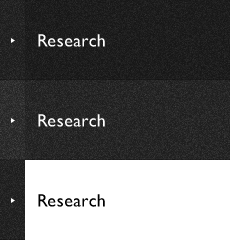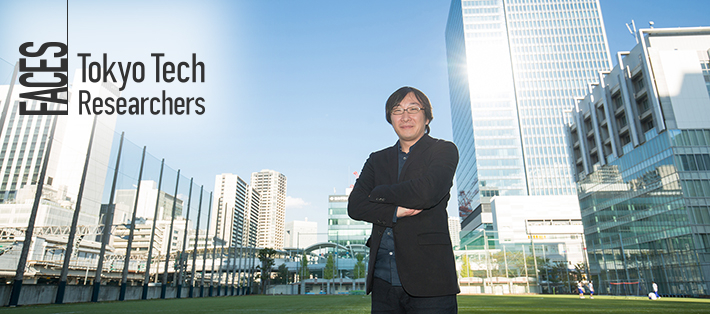
Issue 34
ProfessorYuya Kajikawa
Department of Innovation Science, School of Environment and Society
With the hope of creating a society where people can achieve their full potential, Yuya Kajikawa, professor at the School of Environment and Society, is working to establish a methodology for innovation.
The times require a transdisciplinary approach
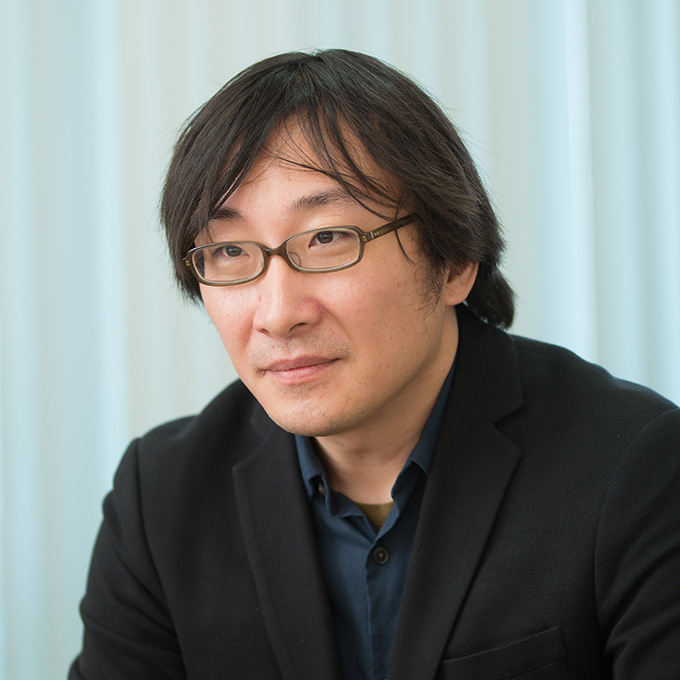
"I specialize in innovation management. Innovation is the creation of value by implementing something new. That something can refer not only to technology, but other creations as well, such as business models and systems. Similarly 'value' includes not only economic benefit, but also social and cultural benefit. As for 'management,' although it is often used to refer to business administration, I consider it to mean 'finding a way.' Therefore, innovation management for me means finding a way to create value," explains School of Environment and Society professor Yuya Kajikawa. Kajikawa works in the Department of Innovation Science and graduate major in Technology and Innovation Management, areas which have attracted many professionals to study alongside other graduate students.
Kajikawa continues, "There is a framework in innovation research called transition management, which focuses on understanding the processes of innovation. In transition management, we consider three primary factors of innovation: technology (engineering, products, and services), regime (social and technological structures), and landscape (social vision).
In the initial stages of innovation, a wide range of technologies, products, and services compete; and at this stage it is unknown which will gain popularity. The social and technological regimes determine what will dominate the market. Regimes include technologies, markets, user preference, social infrastructure and industrial policies, cultural and industrial structures, and corporate strategies. Regimes are in turn influenced by the landscape, which refers to major flows of a community or generation. Such flows may include an aging society, a low-carbon society, and a society striving to achieve sustainable development goals (SDGs). Successful innovation requires us to not only develop technology, but also design regimes and establish a landscape through international initiatives.
This raises the question, what is necessary to achieve innovation? As research fields have progressed, they have grown increasingly segmented and specialized. We have come to believe that any other course would interfere with our global competitive edge. As a result, we have developed silos and octopus pots of R&D. Of course, specialization is necessary. Researchers who dig deeper into their fields are necessary. However, it is also essential for us to adopt interdisciplinary approaches for the sake of creating a better society, one in which we find solutions for the issues we face, such as our aging society and global warming.
In terms of the technologies and products that promote innovation, the necessary knowledge may lie in materials science, process engineering, electromagnetics, or information engineering. Regime design requires a wide range of knowledge, in business administration, economics, psychology, and policy studies. Forming landscapes could require understanding sustainability and future society design. But above all, cooperation with society is essential. Although we have long had interdisciplinary research fields, what we need now is transdisciplinary research."
Disciplinary interactions can be divided into four types: disciplinarity (referring to individual disciplines like science, engineering, law, and humanities), multidisciplinarity, interdisciplinarity, and transdisciplinarity.
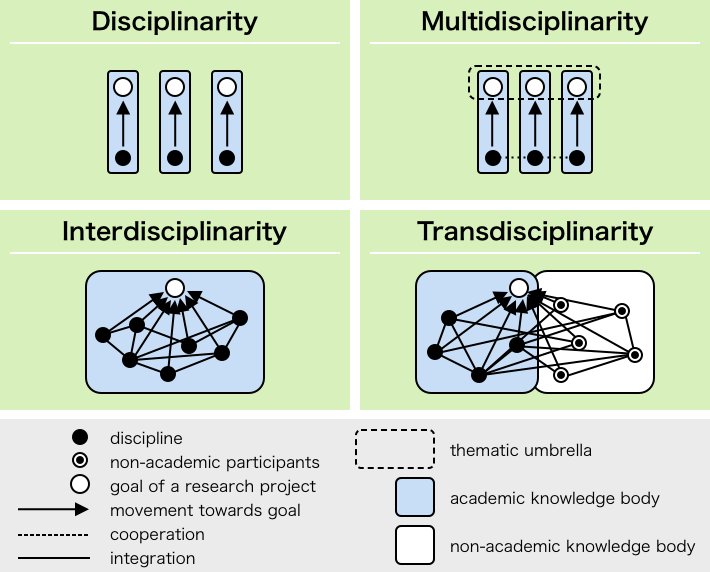
In multidisciplinarity, everything is under one umbrella, with each discipline pursuing independent goals. In interdisciplinarity, each of the disciplines under the umbrella works toward a common goal. In transdisciplinarity, goals focus on activities that intersect with society. These include corporate, local governmental, and regional community activities that are coordinated among a wide range of disciplines and stakeholders. (Gunther Tress, Bärbel Tress, and Gary Fry. (2004). Clarifying integrative research concepts in landscape ecology. Landscape Ecology, 20, 479-493.)
"Literacy in intellectual property management, organization theory, strategy theory, policy creation, and project design are certainly essential in innovation. But even more fundamental are methodologies that enable us to think things through for ourselves, communicate, and, at times, confront others."
Two methodologies for thinking things through
Kajikawa studies two general methodologies for "thinking things through," one being data analysis and the other knowledge engineering.
In data analysis, using statistics, machine learning, natural language processing, network analysis, and other information science methods, he analyzes the tremendous number of papers and patents coming from transdisciplinary research, attains a bird's-eye view each research field, organizes information, and develops tools to extract the most advanced knowledge.
"I have been a bookworm since childhood. I loved to read. When I was a doctoral student, I didn't just do experiments and theory and simulations. I read more than 3,000 papers related to my research theme. Reading in other fields, I also came to learn about bibliometrics. Bibliometrics is the application of quantitative analysis to bibliographic data used to sort and search for articles in books and journals. At the time, network analysis was the trend in bibliometrics. When I was in my third year as a doctoral student, I tried applying network analysis to the papers I read, and I found something very interesting."
Specializing in chemical system engineering from his third-year as an undergraduate to his doctoral studies, Kajikawa read a large number of papers for his research on materials. He then applied network analysis to those papers. What he found was that even if studies shared the same target, like thin film for example, they showed completely different networks when their materials and approaches were different. He also found that different networks applied different mechanisms and models. He discovered that data analysis had the potential to extract hidden relationships between seemingly unrelated materials, relationships that even materials researchers were unaware of.
"I felt that this tool could bring us new and unexpected possibilities, and perhaps help us to discover innovative combinations of materials. My colleague pointed out that, in addition to helping researchers, this method could be useful to companies establishing R&D strategies as well as in government policymaking for science and technology. I developed this tool for my research, but I have since made it available online as an academic overview system for use by researchers and companies in a wide variety of fields."
Kajikawa's second focus, knowledge engineering, is the study of what knowledge is and the development of methodologies to create knowledge.
"In information science, data forms the base of a pyramid. Information sits above data, knowledge sits upon information, intelligence sits upon knowledge, and wisdom is at the top. Data becomes meaningful after being collected, analyzed, and put into context. Statistical analysis and machine learning are tools used to transform data into information. However, information and knowledge are different. Knowledge exists in our brain while information exists outside. Methods that promote the circulation of explicit information and tacit knowledge are knowledge management.
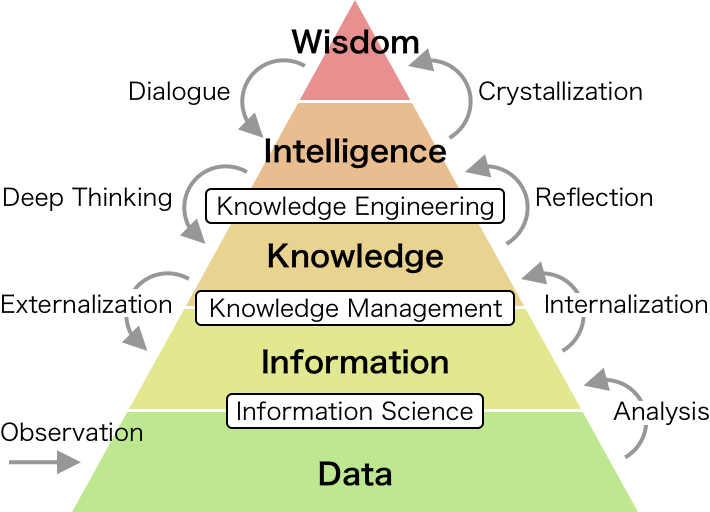
The knowledge pyramid
Nowadays, there is extensive development in machine learning for data analysis. Some say that such methods may take over certain aspects of human work. Routine data analyses may no longer be performed by people, as they can increasingly be handled by information systems. But this will free humans up to handle higher level work. Work that involves applying high-level intelligence, finding alternatives for issues that lack solutions, drawing forms that we desire, all while utilizing data analysis, will increase."
While data analysis and knowledge engineering form the core of Kajikawa's work, as an innovation management specialist, he is involved in projects on energy systems including solar power, secondary batteries, and hydrogen energy, as well as IoT and materials informatics, healthcare informatics, and resource circulation.
What first sparked his interest in technology and innovation management was a factory internship in the spring of his fourth year at university. Kajikawa clearly remembers the look of dissatisfaction on the face of one of the researchers. It was in 1998 when Japan was described as a country that won in technology, but lost in management. Kajikawa felt strongly that he needed to study management as well.
"The reason it is hard to promote innovation in Japan is not a lack of knowledge in material science, but a lack of knowledge in business administration and technology management. Even if we study business administration extensively, without apply it, it is meaningless. We need to think for ourselves how to make use of such knowledge. This is why innovation science and knowledge engineering are necessary."
A society where individuals can realize their full potential
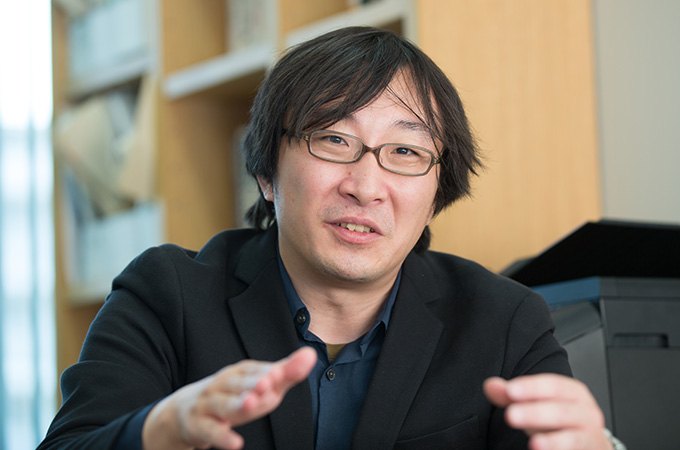
"What should future society look like? And how can we maintain Japan's competitiveness in such a society? Although there are people considering these questions, I feel we ignore the very individuals that make up the society we strive to make competitive. It is essential to create a society where individuals can realize their full potential. This applies to universities as well. The role of the university in society is to provide an environment in which students and faculty who conduct research that benefits society can realize their goals. A university is not so much a physical entity as it is a social function, and it is important we remember this when considering how society can most effectively use its universities.
I want to try new things. I want to experience and create value, both for myself and for society. That is why I try to create new disciplines, to make universities into something even better," explains Kajikawa.
Asked what message he has for students and junior researchers, he states, "Innovation is the creation of value, but value is the result of creation. So first pursue something new. The easiest way to do what no one has done or seen before is to cross borders. Do not limit yourself by thinking that this is the most you can accomplish, or that you shouldn't do something because it's not within your specialty. Continue expanding your potential by questioning common sense, breaking boundaries, and thinking for yourself. Cherish each day, and never forget that you have the ability to change society."
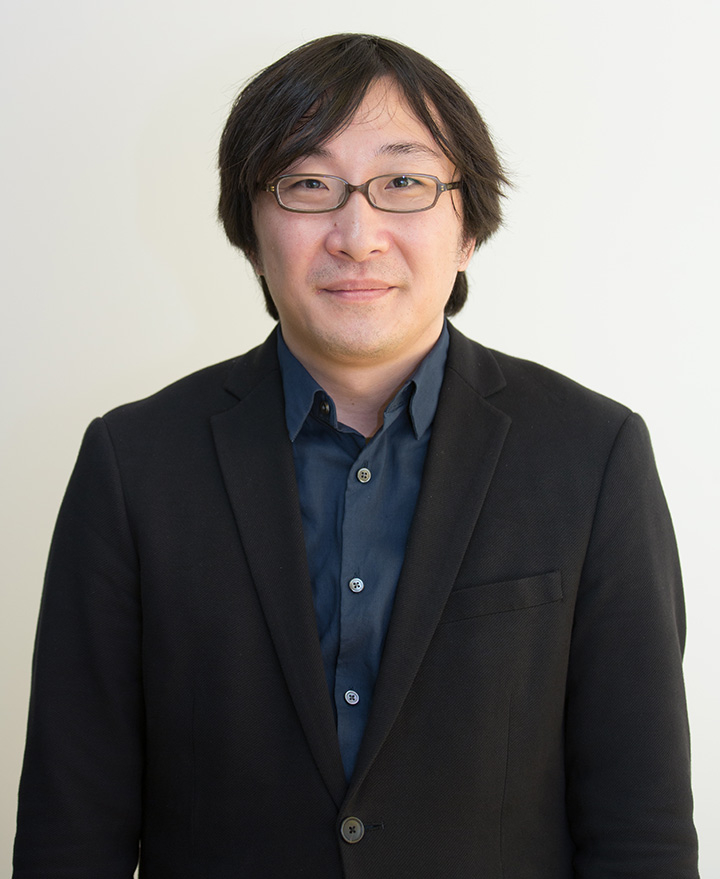
Yuya Kajikawa
Profile
- 2017 – PresentProfessor, School of Environment and Society, Tokyo Institute of Technology
- 2016Associate Professor, School of Environment and Society, Tokyo Institute of Technology
- 2012Associate Professor, Graduate School of Innovation Management, Tokyo Institute of Technology
- 2009Project Lecturer, Graduate School of Engineering, The University of Tokyo
- 2007Assistant Professor, Graduate School of Engineering, The University of Tokyo
- 2005Research Associate, School of Engineering, The University of Tokyo
- 2004Ph.D., Department of Chemical System Engineering, Graduate School of Engineering, The University of Tokyo
- 2003JSPS Research Fellowship for Young Scientists (DC2)
- 2001M.E., Department of Chemical System Engineering, Graduate School of Engineering, The University of Tokyo
- 1999B.E., Department of Chemical System Engineering, School of Engineering, The University of Tokyo
- 1995Graduated, Chiben Gakuen Wakayama Senior High School
The Special Topics component of the Tokyo Tech Website shines a spotlight on recent developments in research and education, achievements of its community members, and special events and news from the Institute.
Past features can be viewed in the Special Topics Gallery.
. Any information published on this site will be valid in relation to Science Tokyo.










